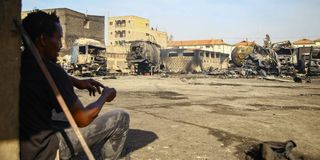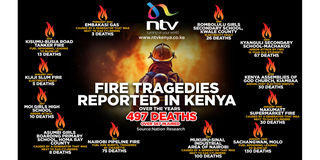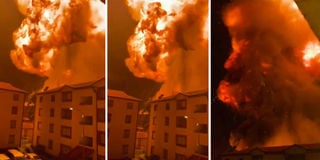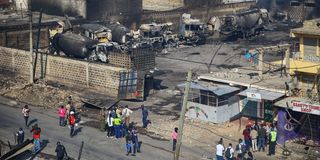Premium
Embakasi gas explosion: Residents say disaster was just a matter of time

The aftermath of a huge gas blast in Embakasi, Nairobi, on Thursday night. Nema has suspended 4 officers over the licensing of Maxxis Nairobi Energy
What you need to know:
- Residents had previously raised the issue of such a facility being in the neighbourhood, Rosemary Wangui, a loca, said. To them, it was always a question of when, not if.
As early as four hours before the disaster, there were already tell-tale signs that something was amiss—a suspicious odour engulfed the neighbourhood. But none imagined that it would end in tragedy and loss of lives.
As Mradi village residents inched towards the catastrophe, their frantic pleas for assistance were not heard—at least not on time. They were failed by the authorities even in their moment of need.
“We were failed by our government. This would not have happened had they listened to our cries, a resident said as he scavenged through the debris of what remained of his house.
Yesterday, Mradi village residents woke up to the horror of a neighbourhood burnt to ashes and completely different from what it was when the sun went down on Thursday.
A vibrant, low-cost residential area sandwiched between Nyayo estate and several businesses was reduced to rubble.

In the Friday morning hours, Vanessa Okeyo, a resident, said she saw lifeless bodies lying on the ground.
“But this was nowhere close to what I watched the previous night,” she recounted. “I saw death.”
Exactly when the gas exploded is not known, but many think it happened at 11.30pm on Thursday while some think it was just after midnight. What they agree on is that it felt like an Armageddon—first, there was a huge bang, then a huge ball of fire billowed through the sky, engulfing the area.

Screengrabs from a user video of the explosion.
Just before the inferno broke out, Alfred Juma remembered warning the driver of an vehicle that was attempting to drive past to consider turning back in vain. He does not remember anything else after that. He woke up on a hospital bed. Wounded and bandaged.
“I asked the doctors to allow me to go back to see if my family made it out alive,” Juma said.
Mwanyika Mwalesi who stays in a nearby apartment recalled pleading with his neighbours to remain indoors. That was moments before shrapnel that rendered him numb hit him. Yesterday, with bandages wrapped all over his head and limbs, he said he was lucky to survive.
The security guard of the premises sat by the gate, engulfed in thought. He was staring at the emptiness and debris of a place he knew as a workstation. With the fire went his bread and butter. And Directorate of Criminal Investigations officers later arrested him, saying they needed him to assist with the investigations.
Many survivors cannot recount the exact moment their lives were turned upside-down.
As the fire engulfed neighbouring buildings, residents of the neighbouring estates coming out in droves amid screams for fear of being caught up in the inferno.
As dawn gave way to sunset, the shock of the magnitude of the disaster that had plunged the neighbourhood into panic was still being felt by residents.
Yesterday, the area was a mixture of ashes, wreckages and debris strewn all over. Together with the cracked walls, abandoned clothes and other items, wounded residents and flattened buildings, it all captured the horror of the incident.
An abandoned meal of chapati and beans wrapped in a plastic carrier bag lay next to the burnt wreckage of the car that is alleged to have ignited the fire.
About 3,000 families were affected, according to rescue teams on the ground, with some individuals in critical condition.
As the sun went down yesterday, Mradi village residents were grappling with the growing number of victims. A neighbour got to know of another nursing injuries, losing property, who couldn’t be accounted for, or who died.
Elly Okumu looked at his belongings and shed a tear. Their plot was right next to the scene of the incident. His neighbour Nelly looked at what was previously her friend’s house and she, too, shed tears. But she mostly worried if she was alive as her phone had since gone silent.
“Mradi will no longer be the Mradi I knew,” Ann Njeri told the Nation. She together with her two-month-old baby survived the fire but lost everything. As the sun was setting, she did not know where they’ll spend the night.
A police report on the incident said it happened when a truck loaded with gas exploded, igniting a fire that spread to neighbouring buildings.
“One cylinder hit Oriental Godown and ignited a fire at the premises, which deals with textiles,” the police incident report said, detailing why the fire could have spread faster and more intensely.

The aftermath of a huge gas blast in Embakasi Nairobi last night.
How such a dangerous venture was set up in a residential area raises many concerns, with the Energy Petroleum Regulatory Authority (EPRA) revealing that the company did not have a licence to set up a gas plant in the area.
Residents had previously raised the issue of such a facility being in the neighbourhood, Rosemary Wangui, a landlord, said. To them, it was always a question of when, not if.
But their cries for help to avert the disaster were ignored.
Moses Eloiloi said, he never knew that “such a calamity would reduce his source of livelihood to rubble”. Shook, he said he could never have imagined that “the immensity of the distraction would this much”. His plot was the most affected, and he feared that he might have lost tenants.
Had the garage owner heeded the residents’ distress calls on Thursday night, the incident could have been avoided, witnesses to the deadly explosion told the Nation.
From around 9pm, shopkeepers and businesses in the area called the garage owner to report a hissing noise, which they suspected was gas leaking from one of the trucks parked in the garage. By 10pm, the pungent smell of the leaking gas had filled the area.
With every tick of the clock, they knew that disaster was at hand.
Desperate calls to the police on 999 went unanswered, witnesses said.
“They only called back minutes after the explosion. I told them that the gas had already exploded,” a witness said.
At the time of going to press, the government indicated that there were three fatalities and injuries at 280. But the residents feared that the numbers would soar.




